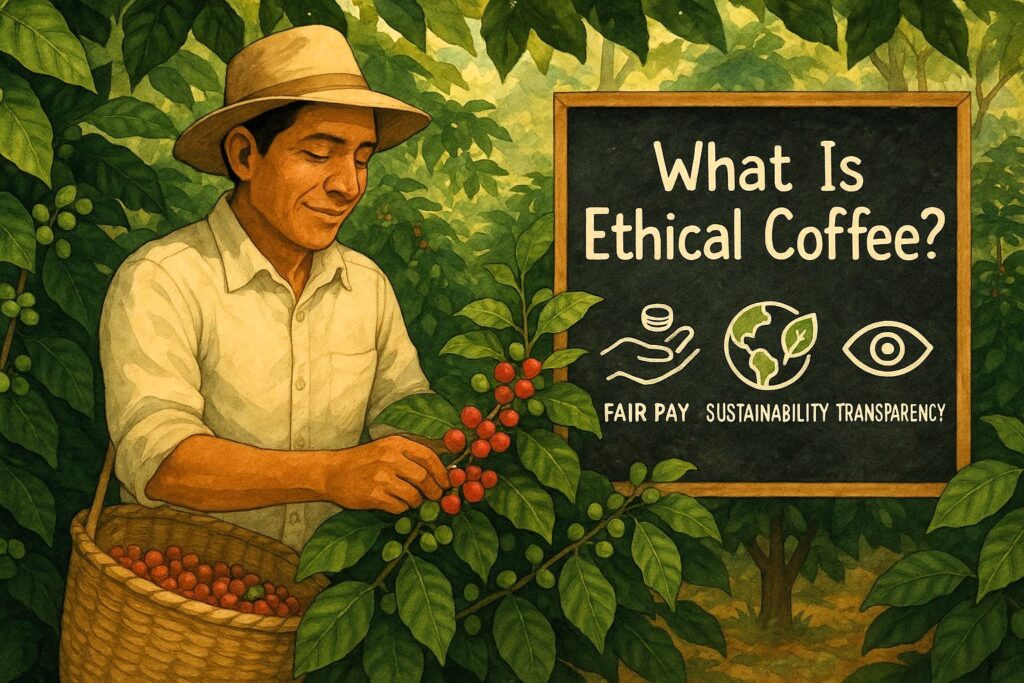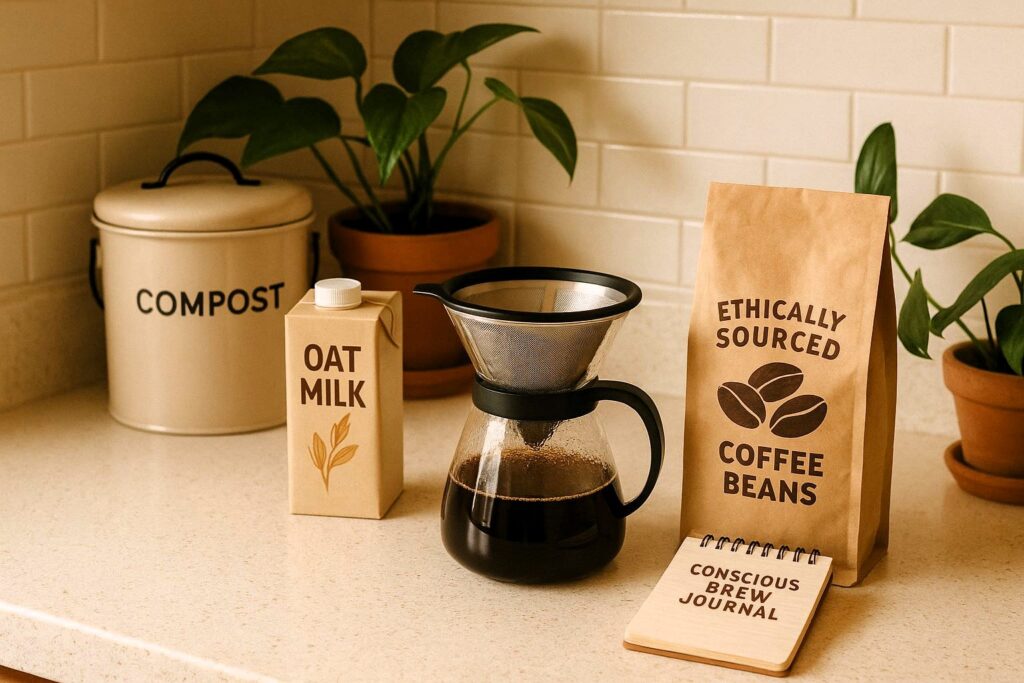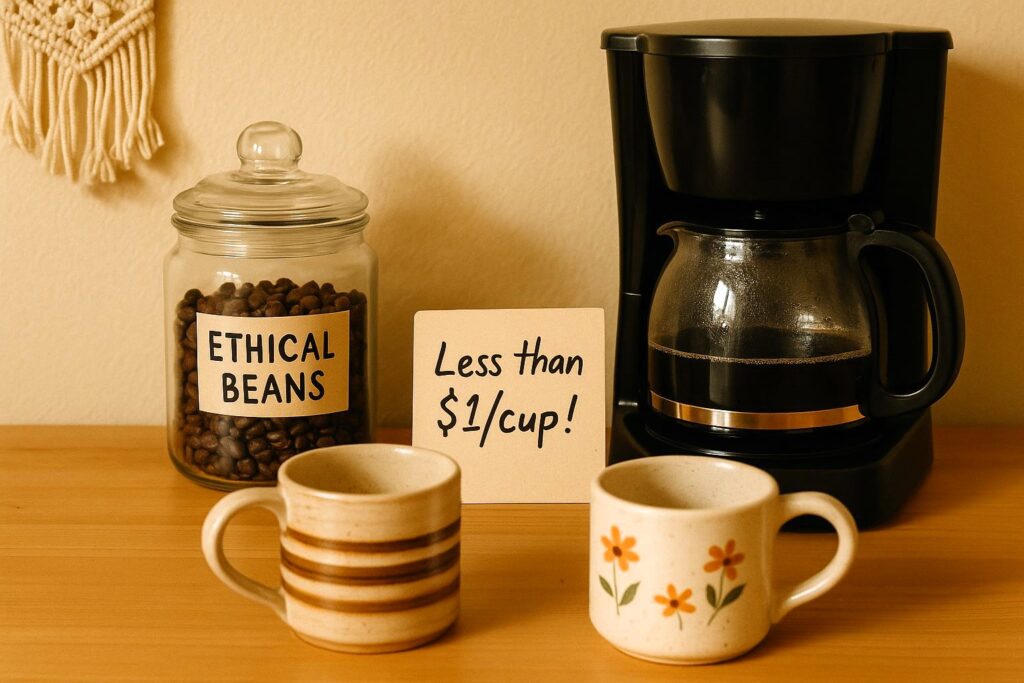Ethical Coffee Explained: How to Start Brewing with Impact and Intention
What is ethical coffee and why does it matter? This beginner’s guide explains how your daily brew can support farmers, protect the planet, and turn your coffee ritual into a lifestyle of conscious impact.

Every cup of coffee has a story. But not all stories are fair.
It hit me on a random morning. I was halfway through my usual brew, scrolling mindlessly when I stumbled on an article titled: “Who Pays the Price for Cheap Coffee?”
Spoiler: not the consumer.
That was my wake-up call. I realized that for years, I’d been sipping without really thinking—about who picked the beans, what they earned, how the land was treated. So I made a shift toward ethical coffee. Not overnight. But step by step.
This blog is for anyone like me—someone who loves coffee, craves comfort, but also wants to make better choices. Let’s decode what ethical coffee really means, why it matters, and how to start brewing with purpose.
☕ What Is Ethical Coffee, Really?
 Ethical coffee refers to coffee that’s produced in a way that’s fair, sustainable, and transparent. That means:
Ethical coffee refers to coffee that’s produced in a way that’s fair, sustainable, and transparent. That means:
-
Fair pay and safe conditions for farmers
-
Sustainable agriculture that protects ecosystems
-
Honest sourcing from roasters who respect the entire supply chain
In short: ethical coffee respects people and the planet.
☕ What Makes Coffee Unethical?
It’s not always obvious, but here are the red flags:
-
Unfair wages: Many coffee farmers live below the poverty line
-
Exploitation: Child labor and unsafe conditions still exist
-
Environmental harm: Mass production often leads to deforestation, soil degradation, and waste
If your coffee is shockingly cheap, someone else is likely paying the real cost.
☕ Ethical Coffee Certifications to Know
Here are the most common (and trustworthy) labels:
-
Fair Trade: Guarantees minimum prices and community support
-
Direct Trade: Roasters buy straight from farmers, often at better prices
-
Rainforest Alliance: Focuses on biodiversity and farming ethics
-
Organic: Grown without synthetic chemicals
-
Bird-Friendly/ Shade-Grown: Protects wildlife habitats and natural ecosystems
Tip: Look for brands that explain how they source—not just slap a sticker on the bag.
☕ My Ethical Coffee Starter Kit

You don’t need to go full eco-guru. I started simple:
-
Switched to a certified ethical brand from a local roaster
-
Asked questions—at cafés, online, at stores
-
Used a reusable coffee filter (say goodbye to daily paper waste)
-
Cut back on dairy some mornings for an eco-friendlier splash
-
Treated my brew like a ritual, not a transaction
The result? A cup that tasted better—because I felt better drinking it.
☕ How to Spot Truly Ethical Coffee
Start with these three questions:
-
Is the origin of the beans clearly stated?
-
Does the brand explain how they support farmers?
-
Are they transparent about certifications or direct trade?
Also, bonus points if the packaging is compostable or recyclable.
☕ But… Does Ethical Coffee Even Taste Good?
YES. In fact, some of the best-tasting coffee I’ve had has come from small-scale ethical farms. The flavors are richer, more distinct—like you can actually taste the care.
Try beans from:
-
Ethiopia (bright and citrusy)
-
Colombia (balanced and nutty)
-
Peru (smooth and chocolatey)
Ethical coffee isn’t just good for your values—it’s often better for your palate.
☕ Ethical Coffee on a Budget
Think ethical means expensive? Think again.
-
Buy in bulk or subscribe to a roaster’s membership
-
Drink less, but better—ditch mindless refills
-
Brew at home instead of daily café runs

Small changes = big impact over time.
☕ Why Ethical Coffee Is a Lifestyle Shift
This isn’t just about beans. It’s about how you show up for the world, every single day.
That first sip? It sets your tone. Wouldn’t it be great if it also aligned with your values?
Ethical coffee means your comfort doesn’t come at someone else’s cost. It means you support dignity, sustainability, and integrity—from crop to cup.
☕ Final Sip: Start Small, Brew Big
 You don’t need to be perfect. You just need to be curious. Ask where your beans come from. Explore one new ethical roaster. Try one new brewing habit.
You don’t need to be perfect. You just need to be curious. Ask where your beans come from. Explore one new ethical roaster. Try one new brewing habit.
Every ethical cup counts.
So tomorrow, when you reach for your mug, ask yourself: Is my coffee just good—or is it good for the world too?
That’s ethical coffee. And it tastes like a better future.

Pingback: Third Wave Cafés: Where Coffee Meets Culture and Connection - Jannes Punita